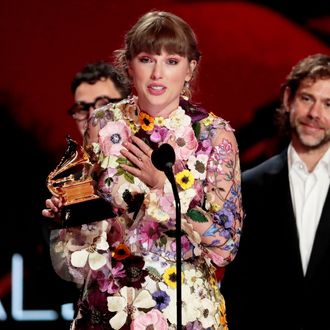
The Recording Academy continues to address recent Grammy criticisms and issues, particularly regarding the Album of the Year award, with a slew of newly passed changes. According to its website, the Recording AcademyÔÇÖs new changes include allowing all contributors to an Album of the Year trophy to earn a trophy, rather than previously restricting trophies to musicians, producers, songwriters, and engineers who contributed to 33 percent or more of the albumÔÇÖs playing time. HereÔÇÖs how that rule went into play recently: Taylor SwiftÔÇÖs boyfriend, Joe Alwyn, did not take home his own trophy when SwiftÔÇÖs folklore won Album of the Year, because at the time, he was only credited as a co-writer on ÔÇ£exileÔÇØ and ÔÇ£bettyÔÇØ (as William Bowery, of course). Later, in April, he was added as a co-producer on six tracks ÔÇö ÔÇ£exile,ÔÇØ ÔÇ£my tears ricochet,ÔÇØ ÔÇ£august,ÔÇØ ÔÇ£this is me trying,ÔÇØ ÔÇ£illicit affairs,ÔÇØ and ÔÇ£bettyÔÇØ ÔÇö and thus became a credited winner. (ItÔÇÖs not uncommon for credits to be updated after a win.) Under the new rules, he would have gotten a trophy from the start, off his ÔÇ£exileÔÇØ and ÔÇ£bettyÔÇØ writing credits alone.
The other big change seems to be targeted at deluxe albums. Album of the Year nominees will now be required to feature 75 percent playing time of previously unreleased music, recorded five years from the release date, rather than a previous requirement of 50 percent new playing time. Last year, that led to Black PumasÔÇÖ Black Pumas (Deluxe) earning a controversial Album of the Year nomination ÔÇö while the original album was passed over for the 2020 awards, the deluxe was eligible for the category since it added around 57 percent new playing time. Since few deluxe albums are three-quarters new material, this change essentially bars deluxes from being nominated if the original albums were already eligible in a previous cycle. Interestingly, the new playing-time requirement doesnÔÇÖt go into effect until the 65th Grammys in 2023, meaning artists bulking up their deluxes for the 2022 awards are in the clear.
Other changes include renaming Best Dance Recording to Best Dance/Electronic Recording; allowing singles to be entered in the classical categories rather than only albums; clarifying that Best Music Film nominees must include at least 51 percent performance and cannot be biopics; and adding a second special Technical Grammy to recognize companies and groups. The Academy also made multiple changes to the visual-media categories, namely clarifying that entries released in a separate cycle than the film they are in are only eligible in the visual-media categories once the film is released ÔÇö artists can choose to submit the music in other categories in the cycle ahead of their film, but will then not be able to submit the music in the visual-media categories in a subsequent cycle. That rule seems targeted at cases like Billie EilishÔÇÖs Bond theme ÔÇ£No Time to Die,ÔÇØ which was released last cycle, while the film No Time to Die has not been released due to pandemic delays. Plus, a new change titled ÔÇ£Vote Trading and ManipulationÔÇØ specifies that members and publicists are now only allowed to ÔÇ£promote only their own recordings, prohibiting lobbying on behalf of other membersÔÇØ ÔÇö because apparently that wasnÔÇÖt the case before!
The changes come after a first round of changes announced in April, namely the elimination of the so-called ÔÇ£secretÔÇØ nominating committees that had been a focal point for the last Grammys, after the Weeknd criticized the committees and boycotted the awards when he received zero nominations off his blockbuster album After Hours. (The committees will remain for 11 craft categories.) Other changes announced then included reducing the number of categories members can vote for and adding two awards, Best Global Music Performance and Best M├║sica Urbana Album.


